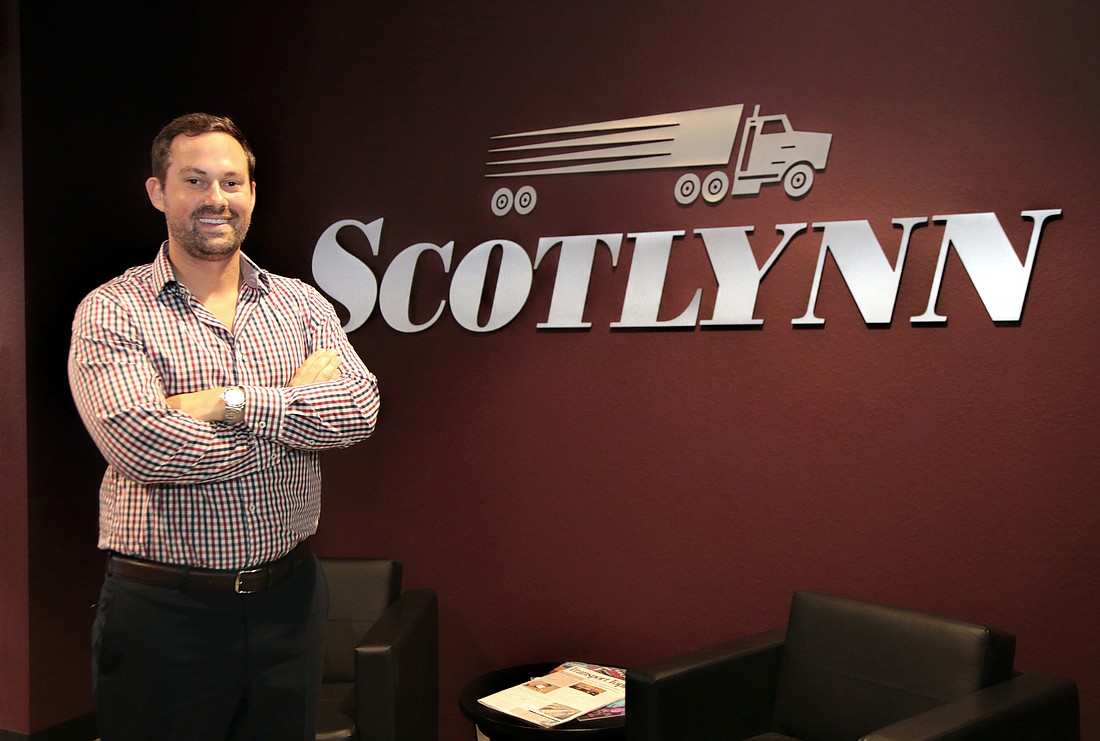- December 25, 2024
-
-
Loading

Loading

If it was an option, most CEOs or business owners would happily sign up for 35% revenue growth during the pandemic.
And although 35% growth from March through October sounds lovely — that’s the actual rate at Fort Myers-based logistics company Scotlynn USA — there’s a flip side to the surge: Bottom-line revenue at the firm, which specializes in transporting refrigerated produce, is down around 50%, making an already hectic business even more complicated to operate.
“We are locked into contracts that reflect past market conditions,” Scotlynn co-Founder Ryan Carter says. “The past few months have been difficult to find profit.”
Despite that cloud, Scotlynn is aggressively taking steps to protect, and grow, market share, so it’s at the front of the line to capitalize when conditions normalize. Those steps include moving forward on an $11 million headquarters project. “We are here for the long run,” Carter says. “As long as we are servicing our clients the best we can, the margins will find its way back.”
‘We are here for the long run. As long as we are servicing our clients the best we can, the margins will find its way back.’ Ryan Carter, Scotlynn USA
A three-story, 60,000-square-foot complex, the headquarters, for which construction began in June, will incorporate contemporary interior design elements that have an industrial feel, reflecting Scotlynn’s core business. Expected to open sometime next year, the facility, at 9597 Gulf Research Lane in Fort Myers, will also come equipped with a gym, a basketball court, a cafeteria, a walking track and an indoor/outdoor recreational space featuring an eating area. (With the move, Scotlynn has agreed to hire at least 140 employees in the next three years, in exchange for performance-based tax credits from Lee County and Enterprise Florida.)
The new space more than doubles Scotlynn’s current 25,000-square-foot facility. Moving into a bigger space mirrors the five-year growth track Scotlynn has been riding: Revenue is up 237% since 2015, from $65 million to $219 million in 2019. The company has some 275 employees, with additional facilities in Tampa and Indianapolis and a second, smaller office in Fort Myers.
Carter got into logistics after graduating from the University of Kentucky in 2006, working for a freight brokerage in Cincinnati. One of his biggest clients was Canada-based Scotlynn Sweetpac Growers. In 2009, the owner of that company, Scott Biddle, recruited Carter to launch Scotlynn USA. Carter’s brother, Brad, helped launch the firm, which at first was in a 900-square-foot office and did $4.5 million in revenue its first year.
Launching during the recession has proven to be a valuable teaching tool for Carter. The current issue the company faces on profit margins, for example, Carter says, isn’t a panic moment but one that calls for patience.
Pre-pandemic market conditions were highly variable for a host of reasons, from weather patterns to driver/human error. It could lead to the price of, say, a shipment of lettuce from Sacramento to Boston rising 30% in one day, Carter says. To combat fluctuations, Scotlynn and other logistics firms bid for work with suppliers in advance. Although price is important, Carter says most logistics companies win or lose repeat business on customer service.
The pandemic, with its early surge on toilet paper and beef, then customer hoarding of goods, has amplified the volatile mix of fluctuations. “There’s no stability and predictability in the market of what trucking rates will be,” Carter says.
The key for Scotlynn, he adds, is to not underbid while using its advanced algorithms to find just-right pricing. Also, given real-time customer service is such a priority, Carter temporarily moved some sales people to logistics in the summer — both to keep them employed and solve problems faster. Most of the sales team is back at it, trying to get more business for the rest of the year and 2021.
An older millennial at 37 years old, Carter says one of the biggest pandemic challenges is to maintain camaraderie with an employee base mostly in their 20s, when not everyone is in the office. Zoom calls were good in the beginning, but, like many other companies, virtual fatigue soon set in. “Trying to fill trying to fill that void has been tough,” he says. “But you have to stay positive. You have to keep the music going.”